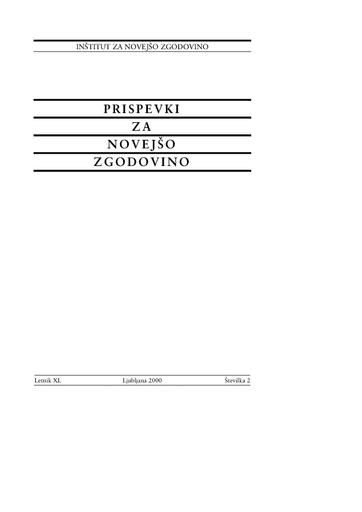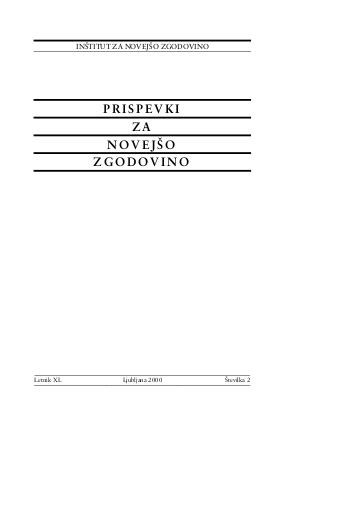
/
Periodicals
/
Prispevki za novejšo zgodovino
Conviction or Opportunism? The Switching of Sides by Candidates in the Parliamentary Elections in Yugoslavia

Author(s):Bojan Balkovec
Co-author(s):Jasna Fischer (odg. ur.)
Leto:2000
Publisher(s):Inštitut za novejšo zgodovino, Ljubljana
Language(s):slovenščina
Type(s) of material:text
Keywords:volitve, Kraljevina SHS, Kraljevina Jugoslavija, kandidati, politične stranke, elections, Kingdom of the Serbs, Croats and Slovenes, Kingdom of Yugoslavia, candidacy, political parties
Rights:

This work by Bojan Balkovec is licensed under Creative Commons Attribution-NonCommercial-NoDerivs 4.0 International
Files (1)

Name:Prispevki_za_novejso_zgodovino_2000_2.pdf
Size:2.33MB
Format:application/pdf
Permanent link:https://hdl.handle.net/11686/file223
Description
The paper presents the legal framework for candidacy in the parliamentary elections in
the Kingdom of the Serbs, Croats and Slovenes and, later, in the Kingdom of Yugoslavia.
Candidates had to be male citizens of age. The manner of compiling lists of candidates is
described and the lists of candidates who stood at the 1920, 1923, 1927, 1931, 1935 and
1938 parliamentary elections are presented. These lists were grouped into three political
camps - Liberal and Peasants', Catholic, and Workers'. The author has determined that only
a few candidates actually switched from one camp to another. Such cases were most
frequent in the Workers' camp, followed by the Catholic, Liberal and Peasants'.
Metadata (12)
- identifierhttps://hdl.handle.net/11686/1826
- title
- Zaradi prepričanja ali koristi? Prestopi kandidatov na starojugoslovanskih volitvah
- Conviction or Opportunism? The Switching of Sides by Candidates in the Parliamentary Elections in Yugoslavia
- creator
- Bojan Balkovec
- contributor
- Jasna Fischer (odg. ur.)
- subject
- volitve
- Kraljevina SHS
- Kraljevina Jugoslavija
- kandidati
- politične stranke
- elections
- Kingdom of the Serbs, Croats and Slovenes
- Kingdom of Yugoslavia
- candidacy
- political parties
- description
- The paper presents the legal framework for candidacy in the parliamentary elections in the Kingdom of the Serbs, Croats and Slovenes and, later, in the Kingdom of Yugoslavia. Candidates had to be male citizens of age. The manner of compiling lists of candidates is described and the lists of candidates who stood at the 1920, 1923, 1927, 1931, 1935 and 1938 parliamentary elections are presented. These lists were grouped into three political camps - Liberal and Peasants', Catholic, and Workers'. The author has determined that only a few candidates actually switched from one camp to another. Such cases were most frequent in the Workers' camp, followed by the Catholic, Liberal and Peasants'.
- V prvem delu razprave so opisani zakonski okviri kandidiranja na volitvah v Kraljevini SHS in Kraljevini Jugoslaviji. Kandidat je moral biti polnoleten moški državljan. Opisan je način sestavljanja kandidatnih list. Predstavljene so kandidatne liste, ki so kandidirale na parlamentarnih volitvah 1920, 1923, 1927, 1931, 1935 in 1938. Kandidatne liste so združene v tri tabore, liberalni in kmečki, katoliški in delavski. Avtor ugotavlja, da je bilo pravih prehodov kandidatov iz enega v drug političen tabor malo. Največ prestopanj je bilo v delavskem taboru, sledi katoliški tabor in najmanj v liberalnem in kmečkem taboru.
- publisher
- Inštitut za novejšo zgodovino
- date
- 2000
- type
- besedilo
- language
- Slovenščina
- isPartOf
- rights
- license: ccByNcNd
Citirano v (1)
| Tipologija | Avtor(ji) | Naslov | Kraj | Založba | Leto |
|---|---|---|---|---|---|
| 1.01 Izvirni znanstveni članek | Kreačič, Goranka | »Važno je prijateljstvo, ki naj ostane« : zgodba o prijateljstvu in političnem udejstvovanju petih mladoliberalcev | Ljubljana | Zveza zgodovinskih društev Slovenije | 2021 |